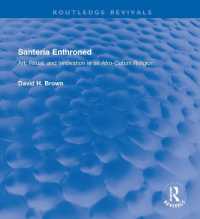- ホーム
- > 洋書
- > 英文書
- > History / World
基本説明
This book is the first to document the vital role played by Americans, not of Japanese ancestry, who served as Japanese language officers in World War II. Covering the period 1940–45, it describes their selection, training, and service in the U.S. Navy and Marine Corps during the war and their contributions toward maintaining good relations between America and Japan thereafter. Author Roger Dingman argues that their service as code breakers and combat interpreters hastened victory and that their cross-cultural experience and linguistic knowledge facilitated the successful dismantling of the Japanese empire and the peaceful occupation of Japan. Based on extensive interviews and unpublished memoirs, this history reveals how these officers learned an extraordinarily difficult language and used it to both hasten Japan's defeat and to assist in the transformation of the Japanese from enemy to ally.
Full Description
Covering the period 1940-1945, Dingman describes Japanese language officers' selection, training, and service in the U.S. Navy and Marine Corps during the war and their contributions to maintenance of good relations between America and Japan thereafter. Arguing that their service as "code breakers" and combat interpreters hastened victory and that their cross-cultural experience and linguistic knowledge facilitated the successful dismantling of the Japanese Empire and the peaceful occupation of Japan, this is a major new work on the history of Pacific warfare during World War II.
Also examining the nature in which the war changed relations between the Navy and academia, the book explores how the lives of these 1200 men and women were also transformed, and set onetime enemies on course to enduring friendship. Its purpose is twofold: to reveal an exciting and hitherto unknown aspect of the Pacific War and to demonstrate the enduring importance of linguistic and cross-cultural knowledge within America's armed forces in war and peace alike.
An exciting and previously unknown story of men and women whose intelligence and devotion to duty enabled them to learn an extraordinarily difficult language and use it in combat and ashore to hasten Japan's defeat and transformation from enemy to valuable friend of the Allied forces.
About the Author
Roger Dingman is an American, international, military, and naval historian with a particular interest in 20th century trans-Pacific relations. His research focuses on Japanese-American relations, and he is currently teaching at the University of Southern California.







